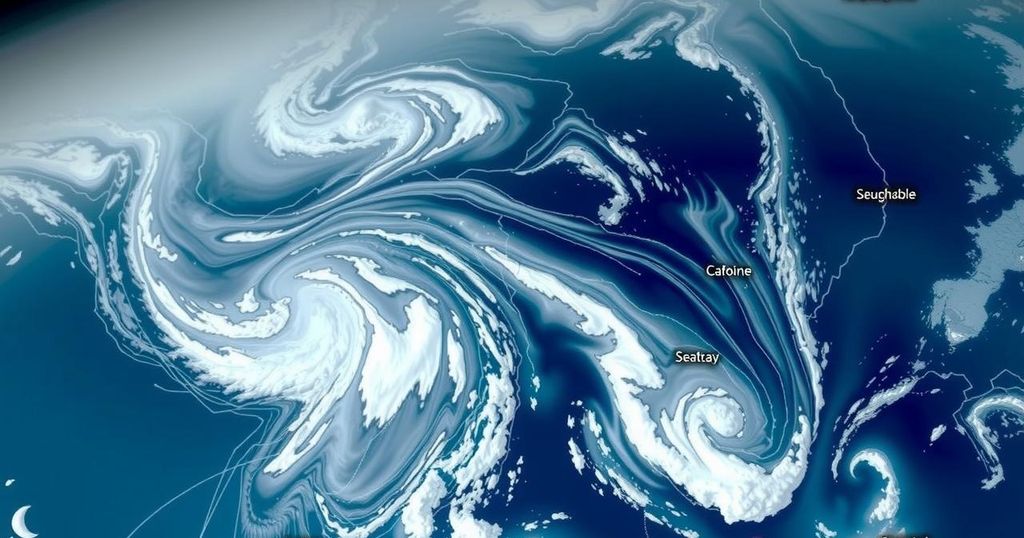Reflecting on Virginia’s Weather Events: A Look Back at 2024
2024 was a transformative year for CommonWx, marked by Hurricane Helene’s devastation, severe droughts, and engaging community events. This year underscored the importance of climate awareness and preparedness for natural disasters, driving discussions among meteorologists on key challenges faced in Virginia’s weather landscape.
As we approach the close of 2024, it is worthwhile to reflect on the significant weather events that shaped the year. This past year marked an important transition for CommonWx, evolving into a monthly newsletter and encompassing three years of continuous engagement with our audience. Throughout 2024, we explored various environmental topics, including the relationship between climate change and severe weather, the application of drones in assessing storm damage, and the substantial dangers associated with flooding.
Among the notable occurrences, Hurricane Helene and severe drought conditions stood out as particularly impactful on Virginia residents. Hurricane Helene, while primarily affecting western North Carolina, led to considerable devastation in Virginia, particularly in the community of Damascus. This catastrophe served as a stark reminder of the risks of flooding, especially for inland areas that are not frequently confronted with the consequences of tropical systems. Mike Bilder of FEMA aptly noted, “Between 2013 and 2022, the number one cause of death from tropical cyclones was inland flooding. But it does seem like it doesn’t get as much attention as it otherwise should.”
Moreover, I had an exhilarating opportunity this year to engage in a weather balloon launch—a crucial practice for meteorologists that has been in place since the 1930s, as it provides invaluable atmospheric data. Robert Stonefield of the National Weather Service highlighted this point when he remarked, “We don’t know what the atmosphere is doing… But we can’t see the moisture, we can’t really see the winds – how it changes as it goes up in the atmosphere.”
Additionally, I found great joy in discussing the weather-related aspects of the much-anticipated film, “Twisters,” during a live event at the Alamo Drafthouse in Charlottesville, marking our first live engagement since the newsletter’s inception. It proved to be enlightening as we discovered several scientifically accurate elements presented in the film.
As we prepare for the new year, I also sought insights from fellow meteorologists and climate journalists across Virginia regarding their reflections on 2024. Meteorologist Sean Sublette emphasized the significance of the flash drought and heat experienced in June, mentioning that “Virginia (statewide) is having its warmest calendar year on record.” Kevin Myatt echoed the sentiment regarding Hurricane Helene and the drought while highlighting the notable severe weather reports on May 26th.
Katherine Hafner noted that while eastern regions were spared major events, they faced persistent challenges with minor storms contributing to flooding issues. The Blacksburg and Wakefield National Weather Service offices provided insights that reinforced the significance of Hurricane Helene and rising flood frequency in the Chesapeake Bay.
In conclusion, 2024 was a multifaceted year for weather in Virginia, marked by pronounced extremes in rainfall, significant storms, and persistent climate concerns. As we move into 2025, I invite your feedback on your favorite newsletter editions and topics you wish to explore further. Thank you for your engagement with CommonWx, and I look forward to continuing our dialogue in the coming year.
In 2024, CommonWx saw its evolution into a monthly newsletter, providing readers with an opportunity to engage with pressing weather-related topics. This year stood out due to varied and extreme weather events that impacted the state of Virginia. Not only did it mark significant advancements in weather monitoring and education, but it also emphasized the urgent conversation surrounding climate change and its effects on weather patterns. Key events, including Hurricane Helene and severe droughts, pushed the limits of residents’ preparedness, prompting discussions about flood risks and the role of meteorological practices such as weather balloon launches. Overall, 2024 served as a pivotal year for meteorology in Virginia, highlighting both the challenges and victories within this field.
Reflecting on the weather events of 2024 reveals a year characterized by dynamic and significant occurrences that have impacted the state of Virginia. The dualities of severe drought and intense storms, particularly Hurricane Helene, highlighted the pressing need for enhanced preparedness for evolving climate patterns. As we transition into 2025, continued engagement and education on these pivotal issues will be paramount to fostering a well-informed public and advancing our understanding of the atmospheric conditions that affect our communities.
Original Source: www.wvtf.org




Post Comment